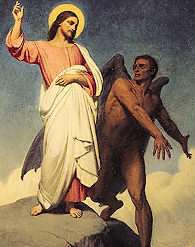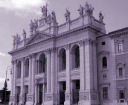The Lord brought us out of Egypt with a strong hand and outstretched arm. (Deuteronomy 26:8)
When we read the story of Jesus’ temptation in the wilderness, we may put brackets around it in our minds, thinking it’s not all that relevant to our own lives. After all, we’re not God’s divine Son. Sure, we may hunger for food, power, and recognition, but we aren’t about to turn stones to bread or throw ourselves off the roof to see if angels will catch us.
But God’s people have always had to face one fundamental temptation: forgetting the Lord and all the ways he has blessed us. The trouble is, when we forget our past, we tend to think that we’re alone in the present, that God isn’t with us to help us and guide us.
Because Jesus never forgot his people’s history, he was able to resist the devil’s temptation. He knew that the God who fed Israel in the desert would not let his Son starve. No, his Father would take care of him in exactly the right way at exactly the right time.
In today’s first reading, Moses exhorts the people to remember their history and to offer God their “first fruits” in gratitude. Each year at the beginning of the harvest, they were to recount their story and insert themselves personally into that story: God made us his own people, he delivered us from slavery, he fed us in the desert, he enabled us to defeat our enemies and settle in the Promised Land.
This is the kind of remembering that we do every time we celebrate the Eucharist. We remember Jesus’ love for us. We remember his teachings, his miracles, and his compassion. We remember his death and resurrection. We remember our own redemption. And as we remember, these events come alive again. We find new grace to resist temptation and continue our journey in faith. So remember the Lord today at Mass. Remember your heritage as an honored, beloved child of God.
“Father, may I never forget your many blessings. Come, Lord, and fill my heart with praise and gratitude.”
Psalm 91:1-2, 10-15; Romans 10:8-13; Luke 4:1-13
Questions for Reflection or Group Discussion
1. In the first reading, Moses reminds the people of all that God has done for them by setting them free from slavery to the Egyptians. He also instructs the people (and the priests) to express their gratefulness and thanks to God by offering him their “first fruits.” Each of us has been set free from slavery to sin, through the death and resurrection of Jesus Christ. What are some “first fruits” you can offer to God out of gratefulness to Him for this wonderful work. What are some gift(s) God has given you that he may be asking you to use for him now?
2. The Responsorial Psalm calls God our “refuge and fortress,” that is, the source of our comfort and strength. Where do you turn for comfort and strength? In light of the many promises of the Lord in this Psalm, how can you overcome the obstacles that keep you from seeking your comfort and strength from the Lord?
3. In the second reading, what does St. Paul say is required to be “saved”? In what ways do you agree or disagree with this?
4. The second reading also says that in Christ all distinctions between people, whether Jew or Greek, have been abolished. Considering that we will all be together in heaven one day, what are the prejudices in your life God might be asking you to eliminate?
5. In the Gospel reading, how would you summarize the temptations of the devil towards Jesus in the desert? How would you relate them to the ways the devil tries to tempt you? In the Gospel, Jesus quotes the truths of Scripture, the Word of God, to respond to the lies and temptations of the devil. How often do you read Scripture on your own now? How often do you use Scriptures (the Sword of the Spirit) as a weapon against the devil’s temptations? What are some steps you can take during Lent that will allow you to read and meditate on Scripture more regularly?
6. The meditation reminds us that “God’s people have always had to face one fundamental temptation: forgetting the Lord and all the ways he has blessed us. The trouble is, when we forget our past, we tend to think that we’re alone in the present, that God isn’t with us to help us and guide us.” Take some time to read and reflect on the words of the last paragraph in the meditation. What steps can you take during Lent to better remember at Mass what the Lord has done for you, and to allow these truths to come alive in a greater way in your life?.
7. Take some time now to pray and ask for the grace to always remember how the Lord has blessed your life, no matter what difficulties you have faced, or may have to face. Use the prayer at the end of the meditation as a starting point.

